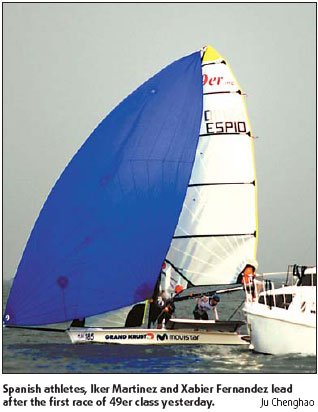Measures taken to curb pollution

QINGDAO: While sailors skirt her coastline, Qingdao's buses shuttle back and forth as an example of many environmentally friendly changes made by the Olympic city.
Qingdao will spend 160 million yuan ($29 million) on 400 Euro III buses this year to upgrade its public transport service and simultaneously reduce pollution emissions by between 50 and 80 percent and, in turn, improve air quality.
New buses represent just one measure the city has taken to curb pollution.
Last year 140 coal-burning boilers and hundreds of old buses were abandoned, making way for more energy efficient models, according to Environmental Protection Bureau spokesman Song Chunkang.
Of the city's 81 billion yuan ($17 billion) investment in 2,476 projects, 2.56 billion ($338 million) was devoted to environmental protection.
More than 106 projects were turned down because they failed to meet standards.
After Qingdao was honored National Model City for Environmental Protection in 2000, satellites Jiaozhou, Jiaonan, Laixi, Jimo and Pingdu followed to claim consecutive titles and help form China's first cluster of environmentally sound cities.
Laixi City, at the upper reach of Qingdao's Dagu River water source, has spent in excess of 300 million yuan ($40 million) on pollution prevention to ensure water quality.
In the past five years, Laixi has rejected more than 30 potentially polluting projects, including 10 multi-million yuan projects.
The city spent 6.65 billion yuan ($875 million) on environmental protection, accounting for 2.07 percent of its total GDP, in 2006, according to an environmental report issued by the Qingdao Environmental Protection Bureau.
Air quality remained on the national air quality standard of Class 2 in 2006 for the seventh consecutive year.
More than 13,000 hectares of trees were planted, increasing the forest coverage rate to 32.95 percent.
About two million trees were planted in the city center, adding 133 hectares of greenery coverage.
The Olympic Sailing Center was also built in accordance with environmental protection.
Recyclable energy sources were used for air conditioning and lighting and both measures earned praises from the International Olympic Committee (IOC) and International Sailing Federation (ISAF).
(China Daily 08/16/2007 page24)


















